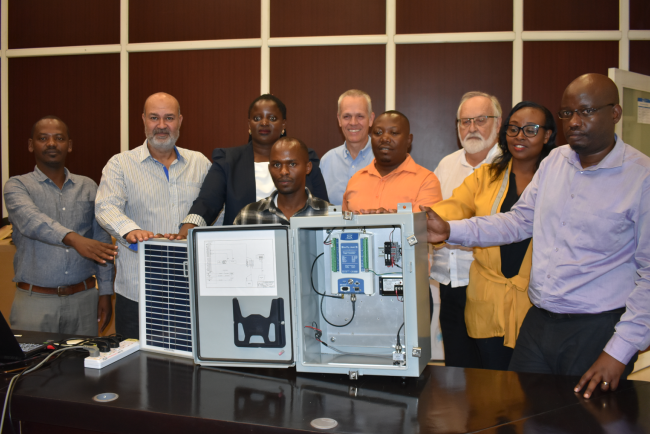Rwanda receives equipment for six HydroMet stations

On 19th September 2022, Rwanda begun assembling, installation and bench testing of Hydromet state-of-the-art equipment received from the Nile Basin Initiative (NBI) in July 2022 for installation of six hydrological monitoring stations (hydromet) in the country. The stations will support water quality and sediment monitoring in several rivers that fall within the Nile River basin in the country. Mr. Remy, Norbert Duhuze the Director for Monitoring and Quality Control at the Rwanda Water Resources Board (RWB) / TAC Member and Mrs. Jacqueline Nyirakamana, the Transboundary Water Resources Cooperation specialist at the Ministry of Environment Rwanda /TAC Member, officially received the equipment from the NBI under the European Union (EU-BMZ) supported Hydromet Project on behalf of the Government of Rwanda.
“These hydromet stations will provide real time data and more reliable information to improve water resources planning and management both at national and regional levels. They will enable better flood and drought disaster mitigation and preparedness, monitoring of surface water quality and sediment transport, coordinated management of water storage dams, navigation, and improved adaptation and resilience to climate change,” said Mrs. Jacqueline Nyirakamana the Transboundary Water Resources Cooperation Specialist at the Ministry of Environment Rwanda / TAC Member, while receiving equipment for installation of the six hydromet stations.
In Rwanda, the hydromet stations will be installed at six (6) locations namely: Gakindo, Gihinga and Cyohoha South in Bugesera District, Akagera Outlet and Kagitumba in Nyagatare District, and Kanzenze in Kicukiro District. Installations of the stations begun on 20th September 2022 and will continue for a week.
As part of this hydrological package, Rwanda has received water level, water temperature and rainfall sensors, data loggers, accessories necessary for installation/ rehabilitation of the six selected stations, equipment for water discharge measurements (ADCP) dual data transmission technology (GPRS and Satellite) with the option to switch to either for compliance with the national policy and country preferences. Rwanda has also received a toolkit for water quality, groundwater and sediment transport monitoring. Information products generated from data collected at the network of stations will be considered as final information for decision making and the country is putting in place a mechanism for sharing these with relevant stakeholders. Upon completion of installation, the hydromet stations will be handed over to the country for operation and maintenance. Training of national staff for this purpose is ongoing. In addition, the national data centre will also be equipped and upgraded to international standards.
Background to the Hydromet Project
The critical gap in data in the Nile Basin was recognized during the preparation of the first set of cooperative projects under NBI. To address the data scarcity in the Nile Basin, NBI is establishing the first Regional HydroMet System for the Nile Basin and is also upgrading the national data management centers. The Hydromets will support NBI Member States in understanding the biophysical phenomena, engage in informed water planning, conduct evidence-based decision making that will lead to improved cooperative water resources management and development.
The hydromet stations will also be installed in other Nile Equatorial Lakes countries namely Burundi, D.R Congo, Kenya, Rwanda, Tanzania, and Uganda as well as in the eastern Nile Countries.
“The Nile Basin regional HydroMet system shall provide the data and information required to facilitate the implementation of various projects and programs and will significantly contribute to socioeconomic development, optimum utilisation of the water and related natural resources, accelerating the implementation of the investment programs, conflict prevention and regional integration,” said Eng. Dr. Isaac Alukwe, the NELSAP Regional Coordinator.
